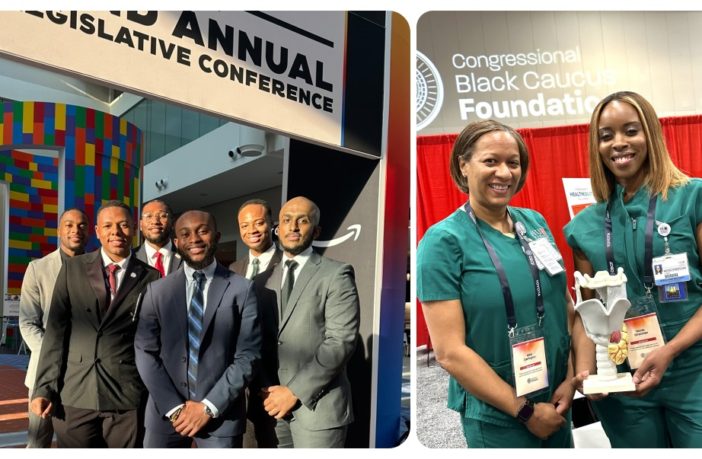By AFRO Staff
The Congressional Black Caucus Foundation’s (CBCF) 52nd Annual Legislative Conference kicked off on Sept. 20. Thousands gathered in Washington D.C., at the Walter E. Washington Convention Center for the event which focused on the theme of “securing our democracy, protecting our freedoms and uplifting our culture.”
“Our mission is to advance the global Black community,” said Nicole Austin-Hillery, president and CEO of the CBCF during her opening press conference. “We do that through a leadership institute where we have interns, fellows and scholars that we put on Capitol Hill, and the c-suites of corporate America.”
“We are creating the next pipeline and generation of leaders who will be change makers in this country,” said Austin-Hillery.
On day one of the conference, organizations such as the National Coalition on Black Civic Participation (NCBCP), American Federation of Teachers, Coalition for Cannabis Policy, Education and Regulation (CPEAR), and the Hip Hop Caucus hosted workshops and panel discussions focusing on mass incarceration, success in the cannabis industry, the power that lies within voting and protecting Black education.
“The Congressional Black Caucus has fought for the past 52 years to empower citizens and address our collective legislative concerns by pursuing a dynamic policy agenda,” stated Congressman Steven Horsford, chair of the Congressional Black Caucus. “We are dedicated to issues like fighting voter suppression and ensuring voting rights. [We are] addressing criminal justice reform, improving racial health disparities, providing access to cutting edge technology, addressing access to the work force and minority owned business capital and resources and–of course–Black economic mobility and wealth building.”
This year’s ALC included the 15th Annual Black Women’s Roundtable Policy Forum Series which focused on the power of the ballot and elevating Black women in leadership. The panel featured community and faith leader, Dr. Barbara Williams-Skinner, White House correspondent of 26 years, April Ryan, and many more powerful women from across the U.S.
“We [have]got to vote,” said Williams-Skinner. “Stop talking about what other people are doing to us, when we won’t even get up out of our house, put our Twitter down – and vote and take our kids to vote. That’s our responsibility.”
Panelists also presented solutions for maintaining Black history, literacy and Black presence in the U.S.
As the two-year anniversary of the Bipartisan Infrastructure Investment and Jobs Act (ILJA) approaches, the CBCF’s Center for Policy Analysis and Research hosted a panel to discuss opportunities in electrical vehicle (EV) charging.
The panel, “Revving Up Change: Charging Forward for Transportation Equity,” discussed how African Americans can participate in and benefit from the construction of the nationwide network of EV charging stations under the ILJA. These chargers will not only be used for personal EVs but also for electric school buses. With this expansion of EV infrastructure, panelists highlighted the need for workforce training in Black communities to ensure they can secure jobs in the burgeoning industry.
“When you have mechanics who have these specialties in vehicles that are not zero- or low-emission, they need training so they are not pushed out of the workforce. It also creates an exciting opportunity to create new jobs in our community,” said David J. Stephen, senior communications specialist for the International Transportation Learning Center. “[There is] a five percent set aside for all the money that is allocated from the Bipartisan Infrastructure Bill to low- and zero-emission vehicles that has to go toward workforce development. That is our opportunity to make sure that we are dedicating that to the recruitment of African Americans who live in these communities where these buses are transporting people.”
Aside from discussing the issues, events and festivities happening during the conference, the event aimed to uplift Black culture with the Taste of ALC series, presented by Amazon and hosted by celebrity Chef Huda Mu’min. The culinary extraordinaire spoke with the AFRO about the importance of being at an event like the ALC and what conference attendees can anticipate.
“I think it’s super important [to be at ALC]because I’ve been blessed to have a platform and it’s always been my goal to give back to our community but to also inspire people,” said Mu’min. “ I think that whenever you participate in a conference– especially this one because it’s for us, by us–it’s important [that]people see what is possible.”
Mu’min shared that she’s hoping guests will leave her demonstrations full of inspiration, knowledge and delicious food.
“With the Just Savor group we always look to inspire, educate and empower people through food. Whether that’s through conversation or cooking demonstrations, we’re always looking for our guests to walk away with something,” explained Mu’min. “Our hope for this year is that we inspire people in a delicious way and with the cooking demonstrations they really get to taste and experience and also gain knowledge from the chefs that are being featured.”
In addition to bringing out elected officials and concerned citizens, the ALC also brought out student journalists like 21-year-old Mona Walls and 20-year-old Sonian Mensah, both Howard University students.
“We need to listen to each other– genuinely listen to each other– not rant and just go about our day,” said Mensah. “We need to be in agreement and we need unity in order to thrive.”
Walls said the conference left her a bit star struck, with all of the Black excellence on full display.
“This was a homework assignment, but I was blown away by talking to everyone we met. I love seeing Black people come together,” said Walls, a journalism major with a minor in political science. “It’s important to talk about the solutions.”



